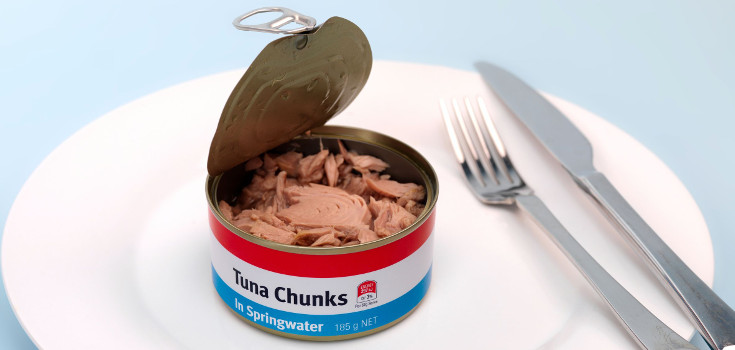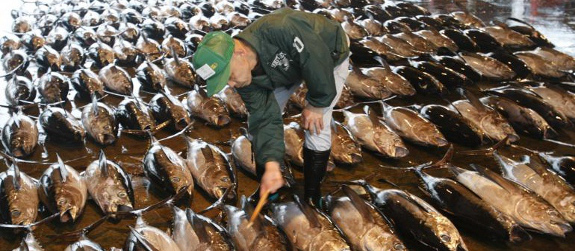4 Reasons Why More People are Turning Away from This Popular Fish
4 Reasons Why More People are Turning Away from This Popular Fish
#3 will surprise you
Tuna is one of America’s favorite canned fish, but that is quickly changing for many individuals who realize the downfall to buying and opening that small can.
Tuna is one of America’s favorite canned fish, but that is quickly changing for many individuals who realize the downfall to buying and opening that small can. From the environmental impact of over-fishing which results in fishery depletion and the accidental catch of other fish like dolphin, to the obvious mercury-contamination we’ve all known about for so long, here is why more people are turning awayfrom canned tuna.
1. Radiation in Tuna
Published in the journal Environmental Science and Technology, one study has found that there are notable effects of the Fukushima disaster being felt by tuna caught off the coast of Oregon.
The team of researchers examined tuna caught off the Oregon coast between 2008 and 2012. In other words, they had tuna before Fukushima occurred and up to the year following. At the most extreme level, the radioactive isotopes tripledfrom the pre- to post-Fukushima samples. Neville says this isn’t enough to be harmful.
“A year of eating albacore with these cesium traces is about the same dose of radiation as you get from spending 23 seconds in a stuffy basement from radon gas, or sleeping next to your spouse for 40 nights from the natural potassium-40 in their body,” he explained. “It’s just not much at all.”
2. Over-Fishing
Ocean overfishing encompasses taking wildlife from the sea at rates too high for fished species to replace themselves, resulting in hasted fish extinction.
“ The earliest overfishingoccurred in the early 1800s when humans, seeking blubber for lamp oil, decimated the whale population. Some fish that we eat, including Atlantic cod and herring and California’s sardines, were also harvested to the brink of extinction by the mid-1900s.”
In response to less diminishing fish populations closer to the surface, commercial fleets are going deeper in the ocean and father down the food chain for viable catches, which is triggering a chain reaction that is upsetting the primal balance of the sea’s biologic system.
Unfortunately, if we continue to fish at such a harsh rate, all the world’s fisheries are predicted to collapse by the year 2048.
The good news is that fish populations could be restored with fisheries management, better enforcement of laws governing catches, and increased use of aquaculture. And in many regions, there is reason for hope.
3. Many Tuna Products are Mislabeled
Genetic testing campaign kickstarted and funded by the nonprofit organization known as Oceana reveals that 59% of tuna is not only mislabeled, but is almost entirely compromised of a fish once banned by the FDA.The tests spanned throughout restaurants and grocery stores alike. Altogether, the findings oust over half of tuna fish as fraudulent.
Between restaurants and grocery stories in the US, 59% of the tuna tested was not tuna, as found by genetic testing. Sushi restaurants had the worst record, with every single restaurant’s ‘tuna’ tested coming back as fraudulent. A whopping 84% of ‘white tuna’ was actually escolar, the snake mackerel fish that causes oily anal leakage and was banned by the FDAuntil 1992.4. Mercury in Tuna
Mercury in tuna is not new news, but perhaps hearing that this issue has gotten better would be? Unfortunately, that isn’t the case. The FDA claims you can have as much as 12 ounces a week of light tuna and up to 6 ounces of albacore, but test results from the Mercury Policy Project (MPP) say these amounts are much too high because of high mercury exposure.
According to Medical News Today, the Mercury Policy Project has suggestedchildren under 55 pounds should only have light tuna once per month and should never have albacore tuna. Children over this weight can have light tuna up to twice per month, though less is ideal.
Of course, adults should be avoiding tuna as well.
| About Mike Barrett: | |
| Mike is the co-founder, editor, and researcher behind Natural Society. Studying the work of top natural health activists, and writing special reports for top 10 alternative health websites, Mike has written hundreds of articles and pages on how to obtain optimum wellness through natural health. | |
Other Popular Stories:





Post a Comment